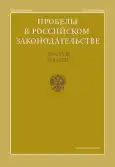Current Problems of Countering Administrative Offense Completed Using Information Technology
- Authors: Dugenets A.S.1, Kanunnikova N.G.2
-
Affiliations:
- Scientific Research Institute of the Federal Penitentiary Service
- North Caucasian Institute of Advanced Training (branch) of Krasnodar University of the Ministry of Internal Affairs of Russia
- Issue: Vol 17, No 4 (2024)
- Pages: 23-29
- Section: Criminal - legal, criminological, administrative and other measures for countering crime in contemporary conditions
- URL: https://journal-vniispk.ru/2072-3164/article/view/265223
- DOI: https://doi.org/10.33693/2072-3164-2024-17-4-023-029
- EDN: https://elibrary.ru/JTEVHC
- ID: 265223
Cite item
Abstract
The processes of informatization and digitalization are intensified in many spheres of life of Russian society and the state, which, in addition to the positive impact, creates significant threats of the spread of illegal practices associated with the use of modern information and digital technologies. Despite the fact that the legal regulation of information legal relations in the Russian Federation is currently receiving close attention, the popularity of mobile communications, the Internet and other technologies for remote interaction of the population causes an expansion in the scope of illegal behavior. In this context, the study of modern mechanisms for combating administrative offenses committed using information technologies is of particular importance. The purpose of the presented study is to analyze the state of modern mechanisms for combating administrative offenses committed using information technologies, identifying existing problems and determining ways to solve them. The author comes to the conclusion that modern mechanisms for countering these acts are characterized by the presence of a number of problems that are objectively determined by the dynamics of information and digital progress, which are ahead of the legal regulation of the stated area, and therefore difficulties arise in identifying, qualifying offenses and imposing fair and proportionate punishment. The fundamental importance of preventive and preventive activities is noted in terms of increasing the level of information and digital literacy to ensure the safe use of modern technologies, which will significantly reduce the vulnerability of the Russian population to offenses of this nature.
Full Text
##article.viewOnOriginalSite##About the authors
Alexander S. Dugenets
Scientific Research Institute of the Federal Penitentiary Service
Email: dugenets@rambler.ru
SPIN-code: 8095-0219
Dr.Sci.(Law), Professor, Honored Lawyer of the Russian Federation, Chief Researcher
Russian Federation, MoscowNatalia G. Kanunnikova
North Caucasian Institute of Advanced Training (branch) of Krasnodar University of the Ministry of Internal Affairs of Russia
Author for correspondence.
Email: natali6977@yandex.ru
SPIN-code: 1256-8712
Cand.Sci.(Law), Associate Professor, Police Colonel, Head of the Department of State and Civil Law Disciplines
Russian Federation, NalchikReferences
- Vodneva K.V. Crime prevention and prevention of offenses in the field of information technology // Eurasian Law Journal. 2023. No. 8(183). pp. 291-293.
- The Code of the Russian Federation on Administrative Offenses dated 12/30/2001 No. 195-FZ (as amended on 04/06/2024) // Collection of Legislation of the Russian Federation. 2002. No. 1 (part 1). P 1.
- Lunkash Yu.V., Makarenko I.A. Prevention in the activities of law enforcement agencies in countering offenses related to information technologies // Information technologies in the activities of law enforcement agencies: current state, problems and prospects: Collection of scientific articles, Orel, April 06, 2023. Orel: Orel Law Institute of the Ministry of Internal Affairs of the Russian Federation named after V.V. Lukyanov, 2023. pp. 70-75.
- Mitryaev I.S. Selected issues of investigation of offenses committed using modern information technologies // Information technologies in the activities of law enforcement agencies: current state, problems and prospects: Collection of scientific articles, Orel, April 06, 2023. Orel: Orel Law Institute of the Ministry of Internal Affairs of the Russian Federation named after V.V. Lukyanov, 2023. pp. 93-96.
- Starodubova O.E., Nazarov N.A. Modern information technologies and information security // Information law. 2023. No. 3(77). pp. 44-45.
- Timoshina E.M. Current trends in the prevention of offenses committed against minors using information and communication technologies // Bulletin of the Krasnodar University of the Ministry of Internal Affairs of Russia. 2023. No. 4(62). pp. 69-75.
- Federal Law No. 149-FZ dated 07/27/2006 «On Information, Information Technologies and Information Protection» (as amended on 12.12.2023) // Collection of Legislation of the Russian Federation. 2006. No. 31 (1 part). P. 3448.
- Yatkevich O.G., Vershinina O.V. Deepfake: from benefits to threats to the inviolability of human rights // International Journal of Constitutional and State Law. 2023. No. 1. pp. 54-58.
Supplementary files








